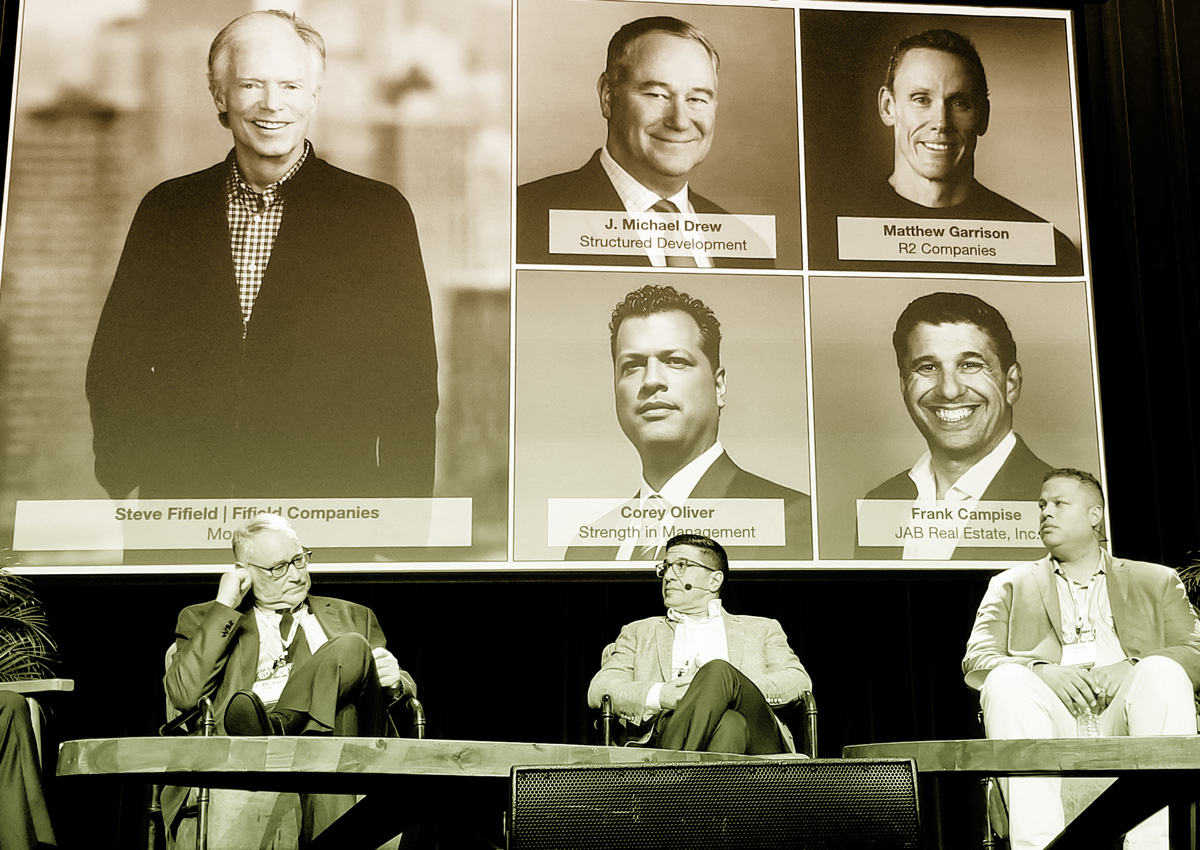Chicago Heavyweights Talk Office Market’s Bottom, Tough Politics
For a moment, it seemed like J. Michael Drew was about to go on the attack.
The founder of Chicago-based Structured Development — which has built several of Lincoln Park’s biggest projects since the firm started 21 years ago — had just accepted honors from the trade group Lincoln Park Builders of Chicago, recognizing his contributions to the neighborhood.
Drew veered from the standard thank yous and pleasantries before an audience of hundreds of other real estate professionals at the Theater on the Lake building on Lincoln Park’s waterfront. He quickly got into his concerns with city policy proposals moving swiftly through government channels under newly elected Mayor Brandon Johnson.
“In today’s dialogue, development is blamed for higher taxes, unaffordable rents, resident displacement and pillaging of neighborhoods,” Drew said. “It is cited as a primary contributor to the widening wealth inequality of today.”
An increased Chicago transfer tax on properties sold for $1 million or more — a measure that City Council sent to voters to decide in March’s election — was high on the list of problems he acknowledged is worrying the industry. And for a brief second, it seemed likely Drew was getting ready to unload on Johnson and his ideas.
“The real estate industry can no longer be reactionary to such initiatives,” Drew said.
Then he pivoted, highlighting points of contention between real estate and Chicago’s increasingly powerful progressive political machine to point out where the industry has opportunities to empathize with the economic conundrums of residents who support Johnson and the transfer tax, along with other recent policy proposals the business community has opposed.
Developers, Drew said, should focus on how they can compromise with those frequently considered the industry’s political opponents and prove real estate shouldn’t be vilified.
“Be a proactive part of addressing (Chicago’s) issues, insist on input and collaboration with policymakers rather than confrontation, provide the financial data to support the industry’s position and contribution to its economy and find alternative pathways to fund today’s social equity challenges,” Drew said. “Change the dialogue from the development community as the problem and redefine it as part of the solution. The future of the city and its neighborhoods may well depend on a new and better way of messaging and addressing the challenges ahead.”
The speech set the tone for the evening as a panel of real estate professionals went on to discuss Chicago’s status as the nation’s leader in the amount of distressed commercial real estate loans in any city, among other challenges the market faces amid an unprecedented crisis in the office sector and sliding property values across all asset classes, thanks to interest rate hikes.
Moderated by longtime Chicago-based developer Steve Fifield — who has helped build the 727 West Madison apartments that recently fetched $232 million from Zara founder Amancio Ortega — the panel was highlighted by R2 Companies head Matt Garrison. His Chicago-based firm is working to close a purchase of the 41-story office tower at 150 North Michigan Avenue at a huge discount from the more than $150 million that seller CBRE Investment Management put into buying and upgrading the property since its acquisition in 2017.
Lenders on office buildings that are at least 80 percent leased and generating some revenue are willing to extend debts, but capital from commercial mortgage-backed security lenders for an office acquisition “basically doesn’t exist,” Garrison said.
And that, he said, is going to lead to a rough road on resetting values.
“It’s going to cause price discovery. This is true price discovery like you don’t normally see in real estate markets. It’s forced liquidations, it’s a market of forced sellers. And we’re going to find out what the price really is in a market of forced sellers with no capital markets. So that’s a crisis,” Garrison said.
After the panel, he told The Real Deal that office pricing has changed so rapidly that “if it were a stock market, they’d shut it down.”
Panelists Frank Campise, of Chicago-based multifamily landlord JAB Real Estate, along with Corey Oliver, who runs the multifamily firm Strength in Management that owns South and West side rentals, noted they’re experiencing multifamily cap rates moving in different directions due to the nature of the assets they own.
“You should kiss (Essex Realty Group’s) Jim Darrow or (Marcus & Millichap’s) Kyle Stengle on the lips if they can get you a 6 percent cap rate,” Campise said. “We’re probably at 6.25, or 6.5, so not pretty.”
Rent growth, however, has been strong lately, Campise noted. He attributed the trend in no small part to the city’s 2021 implementation of a new Affordable Requirements Ordinance, which mandates developers dedicate at least 20 percent of units in new rental projects as affordable housing. That’s slowing down new development and thus supply, Campise said, meaning rents have more room to grow than they would under previous conditions.
But JAB’s focus on established neighborhoods in the city such as Lincoln Park makes it a different story than Strength in Management’s portfolio of assets in communities considered historically disinvested. The firm started buying properties at cap rates as high as 12 and 10 percent, while South and West side properties have recently been increasing in price to drive cap rates down to 7 and 8 percent, in some cases due to out-of-state investors paying prices that Oliver contends are too high, he said.
“There’s going to be a lot of opportunities in South Shore, Woodlawn, Bronzeville, Auburn Gresham, as some of these people who have come in speculating are going to start losing their properties over the next 18 months,” Oliver said.



